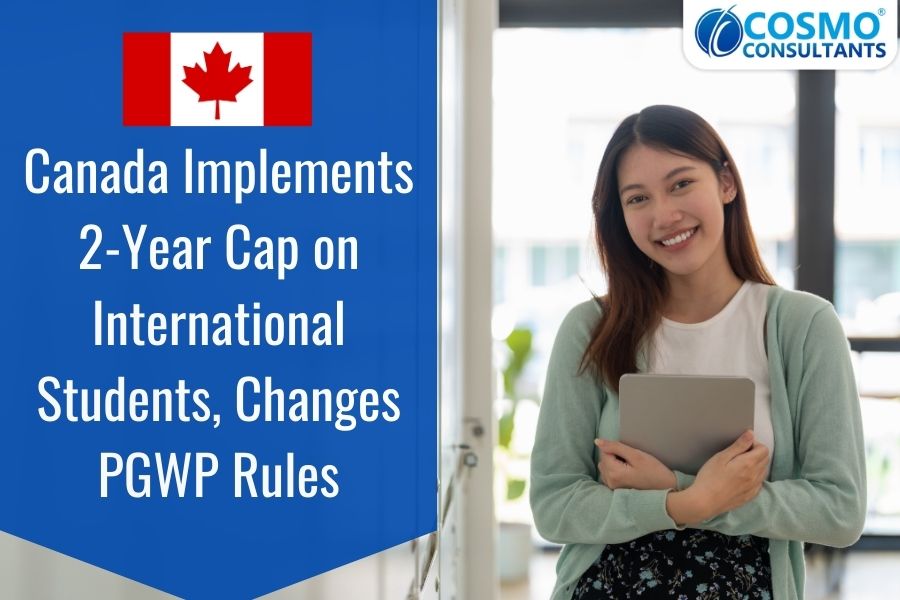
The Canadian government has announced ground-breaking changes to study abroad policy that will
completely
change the outlook for international students. This most recent move, which includes a two-year
cap on study
permits and an extensive change in the Post-Graduation Work Permit Programme (PGWP), indicates a
major
change in Canada's policy toward accepting and integrating overseas students.
First things first: for the next two years, Canada will temporarily decrease the number of study
visa permits it
delivers. Now, this might affect students’ educational plans because it involves more
restrictive admission criteria.
The second main focus is on the major changes made to the Post-Graduation Work Permit Programme.
Now
Spouses of international students at various levels of study, such as undergraduate and
college-level courses, will
no longer be eligible for an open work permit.
Let's look at every detail of these most recent changes and what they mean for aspiring
foreign students who wish
to study in Canada.
There are two major announcements regarding international students from the Canadian government as of, January 22, 2024:
The Government of Canada is temporarily capping the number of new international student permits issued for the next two years, aiming to stabilize growth and address concerns about impacts on housing and other resources. The objective of this strategy is to maintain growth stability and promote a sustainable future for foreign education in Canada.
Intake Cap: A set number of international student permit applications will be accepted for 2024 (approximately 360,000), representing a 35% decrease from 2023.
Province-Specific Allocations: Individual provincial and territorial caps, based on population, ensure fairer distribution, resulting in more significant reductions in areas experiencing the most pressure.
Exemptions: Study permit renewals and applications for masters, doctoral, and elementary/secondary education will not be affected by this cap.
Attestation Letters: A province or territory's attestation letter will be a mandatory requirement for each study visa application submitted to the IRCC starting on January 22, 2024. A procedure for providing attestation letters to students must be established by the provinces and territories by March 31, 2024, at the latest.
Two-Year Duration: The policy will be reviewed at the end of 2024 to determine intake levels for 2025.
Ongoing Collaboration: The government will work with stakeholders to develop a sustainable long-term strategy for international student admissions.
This approach aims to maintain Canada's commitment to foreign education while solving the increased international student population, guaranteeing that designated learning institutions offer sufficient assistance, and protecting students from possible misuse.
To maximize the efficiency of the Post-Graduation Work Permit Programme (PGWP) and guarantee its conformity with Canada's larger foreign student objectives, the Canadian government is introducing changes to the eligibility criteria, starting September 1, 2024.
Curriculum Licensing Restriction: Starting September 1, 2024, overseas students who start a study programme as part of a curriculum licencing arrangement will no longer be eligible for a post-graduate work permit after graduation. Curriculum licencing agreements require students to physically attend a private college that is authorized to provide the curriculum of an affiliated public college.
Extended Master's PGWP: Graduates of master's and other short graduate-level programmes will soon be able to apply for a three-year work visa. Under current criteria, the length of a post-graduate work visa is solely decided by the length of a student's academic course, which limits master's graduates' ability to gather work experience and ultimately move to permanent residency.
Changes in Open Work Permit Criteria: In the coming weeks, open work permits
will only be offered to spouses of
international students pursuing master's and doctorate degrees. Spouses of overseas students
at various levels of
study, such as undergraduate and college programmes will no longer be eligible for open work
permits.
These changes are likely to have an important effect on international students, particularly
those enrolled in certain
programmes or looking for further work experience after graduation. Understanding the details of
these new visa
regulations empowers prospective students to make informed decisions and maximize their chances
of a successful
application to Canada.
Although the Canadian government's declarations on foreign student policy may appear to
change, it is important
to view it as an opportunity for positive change. The two-year cap and PGWP program revamp can
open doors to a
more sustainable and enriching experience for both students and Canadian
communities.
Firstly, a focus on quality over quantity will improve the educational
experience for everyone. By stabilizing the
number of new students, Canada is creating a better environment for everyone. Consider lower
class sizes,
personalized student support, and stronger relationships with local communities.
Furthermore, the updated PGWP programme has huge potential for master's and doctorate
graduates. A three-
year work permit provides multiple chances to gain significant Canadian experience, improve
skill sets, and create
professional networks, all of the necessary phases for permanent residency.
So, don’t be discouraged by these changes. This is an opportunity to embrace a path towards a
richer academic life,
deeper integration into Canadian communities, and a brighter future for both students and Canada
itself.
To summarise, the Canadian government's recent announcements regarding two-year limitations
on foreign
student visas and a redesign of the Post-Graduation Work Permit Programme have sparked major
debate over the
future of studying and working in Canada. As we discuss these changes, students must be aware
of and engage in
the ongoing discussion regarding these regulations.
Cosmo Consultants encourages our Indian students to actively participate in such debates. We
want to hear from
you! What are your opinions on the current announcements? Excited or anxious? How do you feel
about Canada’s
student visa changes?
Do you feel these changes will improve the foreign student experience in Canada, or are you
worried? Please feel
free to express your ideas and concerns by scheduling a free counselling session with our
professional study abroad
counsellors.
Stay in touch with Cosmo Consultants for the latest study abroad updates and advice.
